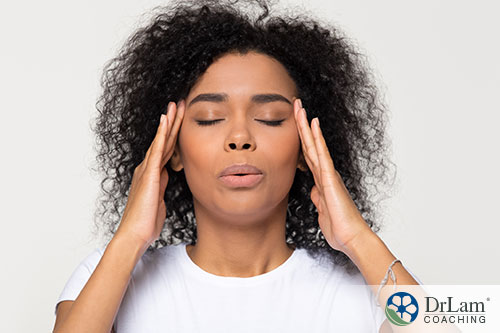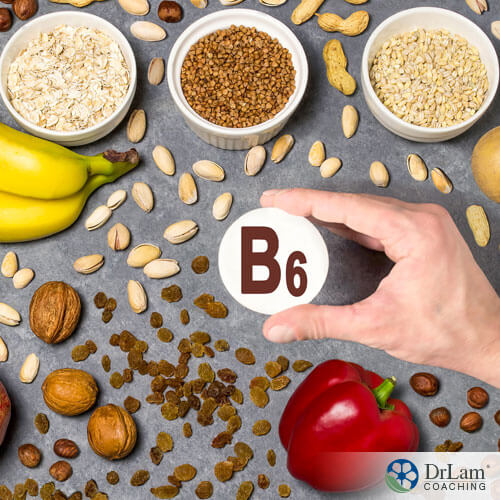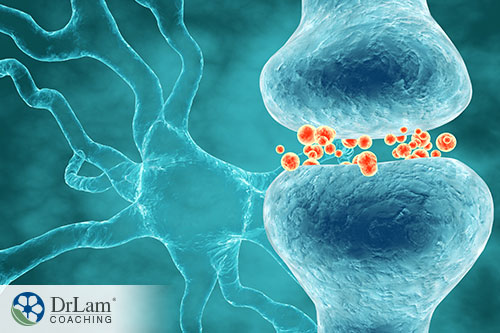Vitamin deficiency can not only cause or worsen anxiety, but anxiety can also deplete your nutrient levels. Medical practitioners often try to rule out vitamin deficiency and anxiety before prescribing anti-anxiety medication. Our bodies need sufficient nutrients to maintain our health and wellbeing. Keep reading as we explore the connection between vitamin deficiency and anxiety.
 Anxiety is a normal reaction to stress (which is a normal part of life). However, you should never ignore anxiety symptoms hoping they'll go away on their own (as they never do). This will merely allow a minor problem to get out of control. If alongside anxiety you also experience depression, chronic fatigue or other debilitating symptoms, then you may have a major nutrient deficiency.
Anxiety is a normal reaction to stress (which is a normal part of life). However, you should never ignore anxiety symptoms hoping they'll go away on their own (as they never do). This will merely allow a minor problem to get out of control. If alongside anxiety you also experience depression, chronic fatigue or other debilitating symptoms, then you may have a major nutrient deficiency.
Numerous studies confirm that vitamins and minerals are necessary for a strong and vibrant body. They also play a major role in regulating your mood, energy levels, and brain health.
We all know we should stop worrying, learn to manage stress, and adopt a healthy diet. So, why are we increasingly plagued with stress-related conditions such as adrenal fatigue, cardiovascular disease, and autoimmune disorders?
The answer is simple – all of these conditions are related to diet. Numerous studies confirm that vitamin deficiency and anxiety, as well as many other mental health disorders, can easily and safely be treated with a change of diet. Taking more vitamins can help us manage stress better. Also, the less we worry, the less our nutrients are being depleted. On the other hand, the lower our nutrient levels, the more anxious we're likely to be. Many people are chronic worriers and more evidence is emerging that vitamin deficiency and anxiety go hand in hand.
If you are prone to panic and hyperventilation attacks, you may simply be nutrient deficient. Both vitamin B6 and iron deficiency are linked with panic attacks. These vitamins help the body produce serotonin. Serotonin is a neurotransmitter that regulates your mood, mental stability, sleep, and the functioning of the entire cardiovascular system.
So, before opting for anti-anxiety medication, you should first do a blood test to make sure you have no vitamin deficiency. Of all the vitamins, vitamin B6 seems to be the most important one for good mental health. It supports your entire nervous system by producing calming neurotransmitters, such as serotonin and Gamma-Aminobutyric Acid (GABA). The main role of GABA is to calm the brain and relax the mind. Insufficient levels of GABA may result in anxiety and panic attacks, nervousness, attention deficit, and aggressive behavior.
 Vitamin B6 can be found in chicken, pork, beef, fish, dairy products, legumes, brown rice, seeds, whole grains, sweet potatoes, potatoes, avocados, and bananas.
Vitamin B6 can be found in chicken, pork, beef, fish, dairy products, legumes, brown rice, seeds, whole grains, sweet potatoes, potatoes, avocados, and bananas.
Vitamin deficiency and anxiety are often caused by poor diet and chronic stress. Therefore, boosting your nutrient intake can improve your mental health with minimum effort.
Some medications may deplete your vitamin B6 reserves and indirectly increase your anxiety. So, if you take medications to manage your anxiety, you should immediately start supplementing your diet with vitamin B6.
Another nutrient essential for good mental health is iron. It helps you feel energized and less irritable, while its deficiency can make you feel anxious and fearful.
However, you shouldn't take iron supplements until you've done a blood test to confirm that you’re iron deficient. This is because too much iron can cause many health problems and even increase anxiety.
There is a healthy and perfectly safe alternative to taking iron supplements. You can increase your intake of foods rich in iron. Most iron can be found in grass-fed beef liver and sardines. If you're a vegetarian, you can boost your iron levels by taking spirulina, dark chocolate, spinach, pistachios, and raisins.
Although vitamin deficiency and anxiety can be easily treated with supplements available over the counter. Be careful with what you take as vitamins. Taking individual vitamins or minerals may lead to a disruption in the overall nutrient balance in your body.
Although your body is capable of coping with occasional stress, it was not meant to cope with stress as a way of life. The mechanism that helps us cope with stress is called the NeuroEndoMetabolic (NEM) stress response.
However, we are all different in how we manage stress. A rested, healthy body will easily deal with both physical and emotional stress. This means that good quality sleep and a healthy, balanced diet are particularly important for those leading busy, stress-filled lives.
Unfortunately, even if you go to bed early, there's no guarantee you'll manage to get any sleep. If you are stressed during most of the day, your body produces more cortisol as a coping mechanism. Therefore, your system will be so full of this hormone that you'll find it difficult to get a good night's sleep. The danger with this is that a sleepless night often disrupts the sleeping pattern. So, sleep deprivation leads to chronic exhaustion, which becomes another stressor.
Those who suffer from Adrenal Fatigue Syndrome (AFS) are certainly familiar with insomnia. They often lie awake in bed all night, unable to stop reliving the day’s events.
Insomnia is a common symptom of adrenal dysfunction. The trouble is this condition is both caused and made worse by chronic stress and an unhealthy diet. Fortunately, disorders arising from vitamin deficiency and anxiety are preventable and easily corrected by simple lifestyle changes.
If you feel unable to avoid or reduce stress in your life, then it’s vital to learn more about the link between vitamin deficiency and anxiety. This will help you maintain good health despite a hectic lifestyle.
 Chronic stress negatively affects your brain in many ways. If this gets out of control, it may lead to learning difficulties, high blood pressure, stroke, and depression.
Chronic stress negatively affects your brain in many ways. If this gets out of control, it may lead to learning difficulties, high blood pressure, stroke, and depression.
The medial prefrontal cortex is the part of your brain responsible for cognitive functions and it’s very sensitive to stress. Even mild stress contributes to the loss of some cognitive abilities, while prolonged stress causes major, long-term consequences.
As your medial prefrontal cortex shrinks (due to chronic stress) and your grey matter disappears. Neurons are specialized nerve cells that receive, process, and transmit information from the body to the brain. Therefore, the corresponding increase of white matter makes it more difficult for neurons to connect.
Neurotransmitters are the chemical messengers that transmit the message carried by neurons. Vibrant neurotransmitters are very important for your overall health because they regulate different bodily functions. This means that even a slight chemical imbalance in neurotransmitters will be felt everywhere in the body.
The main neurotransmitters are dopamine, norepinephrine, adrenaline, acetylcholine, and serotonin. The two most important ones are norepinephrine (NE) that regulates the sympathetic nervous system, and serotonin, the “feel-good” chemical.
Norepinephrine helps regulate attention and plays an important part in the fight-or-flight response. It puts the body in a state of mental alertness and helps it deal with everyday stress.
Unfortunately, those who lead very stressful lives risk having their brains flooded by norepinephrine. This can lead to tissue inflammation, high blood pressure, symptoms of hyperthyroidism, and panic attacks.
Vitamin B6 is essential in producing serotonin and norepinephrine. These are two of the neurotransmitters that help regulate your mood. However, both a deficiency and excess of these neurotransmitters can cause a lot of health problems.
Side effects of long term excess of serotonin:
Side effects of long-term depletion of serotonin:
Chronic stress, an unhealthy diet, and certain medications can easily deplete your body's supply of nutrients. This will increase your stress level, cause a range of symptoms, and may even bring on adrenal fatigue. It's also linked to anxiety and other related problems. Here's how to prevent vitamin deficiency and anxiety:
Balancing your diet can be difficult, particularly if you're trying to use it to correct specific problems. If you need help, then click here to talk to one of our expert team or give us a call on +1 (626) 571-1234.
© Copyright 2020 Michael Lam, M.D. All Rights Reserved.
Most people suffering from panic and hyperventilation attacks are low in vitamin B6 and iron. These nutrients are essential for the production of serotonin, which is known to prevent these conditions. Therefore, a link between vitamin deficiency and anxiety should always be ruled out before opting for anti-anxiety medication.
